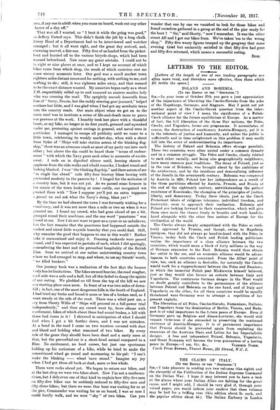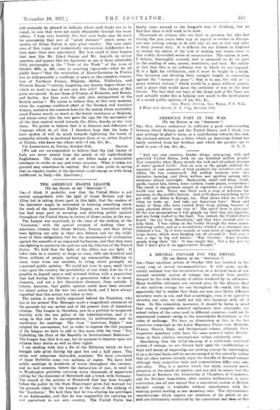THE CLAIMS OF ITALY.
ITO can Exuma or ens " Setoreiroz."1
Su,-1 take pleasure in sending you two volumes (the eighth and the eleventh) of the Publication of the Italian Supreme Command on the Italian War. I hope it may interest you to have a look at the places where your Italian Allies are fighting for the great cause, and I might add, I should be very glad if, through your valued paper, you would inform your readers that these volumes may be had for a trifling eum (this edition about IL each, and the popular edition about ed.). The Italian Embassy in London will certainly be pleased to indicate where such books are to be found, in case they were not easily obtainable through the boot- sellers. I hope very heartily, Sir, that such books may do much for overcoming that sort of " misty distance " which seems to involve all things Italian in your great country. The very exist- ence of this vague and undoubtedly unconscious indifference has been more then once repudiated. But how could it then happen that men like Mr. Lloyd George and Mr. Asquith in recent speeches, and papers like the Spectator in one of those admirable little paragraphs in the "News of the Week" of the issue of October 20th, p. 402, come to asserting vigorously—what we all gladly hear—"that the restitution of Alsace-Lorraiue to France was as indispensable a condition of peace as the complete evacua- tion of Northern France. Belgium, Serbia, Wallachia, and Western Russia "—utterly forgetting our dearest hopes—those for which we went to war of our own free will? The claims of Bel- gium are sacred. So are those of France, of Rumania, and Russia. and Serbia. Are then ours the only ones unimportant to the British nation f We refuse to believe this, at this very moment, when the supreme combined effort of the German and Austrian Armies, united in the common hate for the nation whose neutrality saved France nearly as much as the heroic resistance of Belgium, and whose entry into the war gave the sign for the movement of all the then neutral world towards the Allies, knocks at our very doors. We prefer to believe that it is distance and difference of language which do all that. I therefore hope that the books I have spoken of will do much towards tightening the bonds of 'sympathy already so profound between those of us, either English or Italian, who know the others well.—I am, Sir, &c., Via Lamarmora dl, Torino, October 27th. SALVATI. [We ask our correspondent to believe that the just claims of Italy are never absent from the minds of all right-thinking Englishmen. The claims of all our Allies make a formidable catalogue to recite on any and every occasion. What is taken for granted may sometimes be omitted. But we take pride in saying that no regular reader of the Spectator could charge us with being indifferent to Italy.—En. Spectator.]



































 Previous page
Previous page